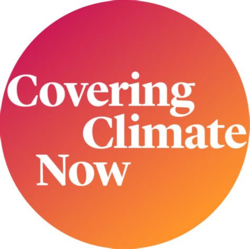Covering Climate Now
(Propagandist) | |
|---|---|
 | |
| Formation | 2019 |
| Founder | • Columbia Journalism Review • The Nation • The Guardian • WNYC |
| Interests | Net Zero |
| Organization providing "urgent climate stories" to a large number of corporate media, | |
Covering Climate Now (CC Now) is an organization providing "urgent climate stories" to a large number of corporate media.[1][2]
Own words
CC Now collaborates with journalists and newsrooms to produce more informed and urgent climate stories, to make climate a part of every beat in the newsroom — from politics and weather to business and culture.
Co-founded by the Columbia Journalism Review and The Nation in association with The Guardian and WNYC in 2019, CCNow’s 460-plus partners include some of the biggest names in corporate media. In addition to the three biggest news agencies — Reuters, Bloomberg, and Agence France Presse — each of which provides content to thousands of other newsrooms, our partners include CBS News, NBC and MSNBC News, Noticias Telemundo, PBS NewsHour, Univision, Al Jazeera; most of the biggest public radio stations in the US; many flagship newspapers and TV networks in the Americas, Europe, and Asia; and dozens of leading magazines and journals, including Nature, Scientific American, Rolling Stone, HuffPost, Teen Vogue, and Mother Jones.[3]
Funding
Covering Climate Now receivied grants from Actions@EBMF, David and Lucile Packard Foundation, Michaux Family Foundation, Park Foundation, Rockefeller Family & Associates, Schumann Media Center and Wayne Crookes.[4] The fiscal sponsor for Covering Climate Now was The Fund for Constitutional Government, originally founded to expose governmental corruption.[5] Its which again is sponsored by among others the Ford Foundation, the Democracy Fund, the William and Flora Hewlett Foundation, and the Rockefeller Brothers Fund.[6]
Language guidance
CC Now includes a language guide for journalists on how to put climate change alarmism into every story, pointing out that "an extreme weather story that doesn’t mention climate change is incomplete and potentially even inaccurate."[7]
Guidance include:
- Not all environment stories are climate stories, but the relationship between climate change and the environment is often overwhelmingly apparent. Don’t miss it in your stories! A story about urban pollution, for example, might note briefly that the health consequences of that pollution are similar to, and exacerbated by, local climate impacts — or that the source of that pollution, in the case of fossil fuels, might be harming the climate at the same time that it’s harming the environment.[7]
For example:
- This [heatwave] is exactly the sort of extreme weather that scientists around the world associate with climate change/a warming planet.
- This [hurricane] comes at a time when human-caused climate change is consistently making storms like it more intense.
- Emphasizing the human impacts of extreme weather can help drive home the significance of climate change. If you’re covering how an extreme weather event is affecting marginalized people especially, be sure to also note that this is characteristic of climate change.
Even though direct attribution is not scientifically possible, it should nevertheless always be included:[7]
- Concern: "I’m unsure how climate change is responsible for this event." The Reality: Direct attribution to a single incidence of extreme weather is possible — but it’s tricky and can take time. Science is nevertheless explicit that climate change sets the conditions for extreme weather to be more likely and worse, and that’s a fact you can include in your reporting now.
On heat in the American West in 2021: "Fueled by climate change, the first major heat wave of the summer has seized the western United States, toppling records and threatening lives." – Sarah Kaplan in The Washington Post
References
- ↑ https://coveringclimatenow.org/about/
- ↑ https://dailysceptic.org/2022/12/20/how-billionaires-fill-the-media-with-climate-fear-and-panic/
- ↑ https://coveringclimatenow.org/about/
- ↑ https://coveringclimatenow.org/about/
- ↑ https://www.fcgonline.org/our-mission/
- ↑ https://projects.propublica.org/nonprofits/full_text_search?utf8=%E2%9C%93&q=fund+for+constitutional+government
- ↑ a b c https://web.archive.org/web/20230226085627/https://coveringclimatenow.org/resource/your-guide-to-making-the-climate-connection/